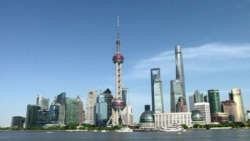ສະຫະລັດແລະຈີນ ສະຫຼຸບການເຈລະຈາທາງດ້ານການຄ້າ ອີກຮອບນຶ່ງຊຶ່ງທັງສອງຝ່າຍ ເອີ້ນການພົບປະທີ່ນະຄອນຊຽງໄຮ້ວ່າ ກົງໄປກົງມາແລະສ້າງສັນ. ແຕ່ໃນຂະນະດຽວກັນ ທັງສອງຝ່າຍກໍໄດ້ສະແດງຄວາມບໍ່ພໍໃຈ ຕໍ່ກົນລະຍຸດຂອງອີກຝ່າຍນຶ່ງ. ນັກຂ່າວວີໂອເອ Zlatica Hoke ມີລາຍງານ ກ່ຽວກັບເລື້ອງນີ້ ຊຶ່ງໄພສານຈະນຳ ເອົາລາຍລະອຽດ ມາສະ ເໜີທ່ານ ໃນອັນດັບຕໍ່ໄປ.
ການເຈລະຈາຢູ່ນະຄອນຊຽງໄຮ້ ຊຶ່ງເປັນຫົວເມືອງໃຫຍ່ທີ່ສຸດຂອງຈີນແລະສູນກາງການເງິນຂອງໂລກ ໄດ້ສິ້ນສຸດລົງ ໂດຍປາສະຈາກການຕົກລົງກັນ ແຕ່ຄະນະເຈລະຈາກ່າວເຖິງຄວາມກ້າວໜ້າ ແລະຕົກລົງທີ່ຈະພົບພໍ້ກັນອີກ ໃນເດືອນກັນຍາທີ່ຈະມາເຖິງນີ້.
ສະຫະລັດ ໄດ້ກ່າວຫາຈີນວ່າ ພະຍາຍາມຖ່ວງເວລາໂດຍຫວັງທີ່ຈະໄດ້ຮັບ ຂໍ້ຕົກລົງທີ່ໄດ້ປຽບຫຼາຍຂຶ້ນ. ແມ່ນແຕ່ກ່ອນເລີ້ມການປະຊຸມກັນ ປະທານາທິບໍດີສະຫະລັດ ທ່ານດໍໂນລ ທຣຳ ໄດ້ເຕືອນປັກກິ່ງວ່າ ທ່ານອາດຈະກຳນົດເງື່ອນໄຂການຄ້າທີ່ເຂັ້ມງວດກວ່າເກົ່າຕໍ່ຈີນ ຖ້າຫາກການເຈລະຈາບໍ່ສາມາດຕົກລົງກັນໄດ້ ກ່ອນການເລືອກຕັ້ງປະທານາທິບໍດີ ໃນປີ 2020. ປະທານາທິບໍດີທຣຳກ່າວວ່າ:
“ພວກເຂົາເຈົ້າຈະມັກຫຼາຍ ຖ້າຫາກຂ້າພະເຈົ້າປລາໄຊ.”
ກະຊວງການຕ່າງປະເທດຈີນກ່າວໃນວັນພຸດຜ່ານມານີ້ວ່າ ປັກກິ່ງຈະບໍ່ຍອມຮັບເອົາການກົດດັນໃດໆ. ທ່ານນາງຫົວ ຈິນຢິ້ງ ໂຄສົກກະຊວງການຕ່າງປະເທດຈີນ ກ່າວວ່າ:
“ມັນໄຮ້ປະໂຫຍດທີ່ຈະບອກໃຫ້ຄົນອື່ນກິນຢາ ເວລາເຈົ້າເອງບໍ່ສະບາຍ. ກ່ຽວກັບການເຈລະຈາໃນເລື້ອງການຄ້ານັ້ນ ພວກເຮົາຄິດວ່າ ສະຫະລັດຄວນສະແດງຄວາມຈິງໃຈແລະຄວາມປະສົງດີຫຼາຍໄປກວ່ານີ້.”
ທັງສອງຝ່າຍໄດ້ພົບປະແບບເຊິ່ງໜ້າເປັນເທື່ອທຳອິດ ນັບຕັ້ງແຕ່ພວກເຂົາເຈົ້າບໍ່ສາມາດບັນລຸຂໍ້ຕົກລົງໃນການພົບປະທີ່ວໍຊິງຕັນ ເມື່ອສອງເດືອນກວ່າໆຜ່ານມາ. ຄະນະຜູ້ແທນຂອງອາເມຣິກັນ ທີ່ນຳພາໂດຍ ຜູ້ຕາງໜ້າທາງດ້ານການຄ້າຂອງສະຫະລັດ ທ່ານໂຣເບີດ ໄລໄທເຊີ ແລະ ລັດຖະມົນຕີກະຊວງການເງິນ ທ່ານສຕີເວັນ ມນຸກຊິນ ໄດ້ທຳການເຈລະຈາ ກ່ຽວກັບການໃຫ້ຄວາມໝັ້ນໝາຍຂອງຈີນທີ່ຈະຊື້ສິນຄ້າກະເສດຂອງອາເມຣິກັນ. ຈີນຢາກໃຫ້ອາເມຣິກັນຫຼຸດພາສີສິນຄ້າຂອງຕົນ ທີ່ສົ່ງເຂົ້າມາໃນສະຫະລັດ.
ທ່ານໂຮນເດີ ສມາຍດິງ ຫົວໜ້ານັກເສດຖະສາດທີ່ທະນາຄານການລົງທຶນລະຫວ່າງປະເທດ ເບເຣນເບີກ ໃນເຢຍຣະມັນ ບໍ່ຄາດວ່າ ຈະມີການຕົກລົງກັນໄດ້ໃນໄວໆນີ້. ທ່ານກ່າວກ່ຽວກັບເລື້ອງນີ້ວ່າ:
“ເສດຖະກິດຈີນແມ່ນກາງຕໍ່ການຂາຍສິນຄ້າຢູ່ໃນສະຫະລັດ ແລະການຕິດຕໍ່ກັບບໍລິສັດຜູ້ນຳເທັກໂນໂລຈີໃນສະຫະລັດຢູ່ໃນເຂດຮ່ອມພູຊິລີກອນວາເລຫຼາຍກວ່າ ໃນທາງກັບກັນ. ແຕ່ລະບົບການເມືອງຂອງຈີນ ແມ່ນມີຄວາມອົດທົນຫຼາຍກວ່າ ເມື່ອປຽບທຽບໃສ່ລະບົບການເມືອງອາເມຣິກັນ. ທັງສອງຝ່າຍບາງທີອາດຈະຄິດວ່າ ຕົນມີໃພ້ທີ່ດີກວ່າອີກຝ່າຍນຶ່ງຢູ່ໃນມື ແລະນັ້ນຄືວ່າ ເປັນຫຍັງມັນຈຶ່ງຍາກແທ້ ທີ່ຈະຕົກລົງກັນໄດ້.”
ແຕ່ນັກເສດຖະສາດ ທີ່ມີສຳນັກງານຕັ້ງຢູ່ເມືອງແຮມເບີກຍັງເຕືອນວ່າ ການແກ່ຍາວໃນການຜິດຂ້ອງຕ້ອງຖຽງກັນ ອາດຈະເປັນການບ່ອນທຳລາຍຕໍ່ເສດຖະກິດຂອງໂລກ. ທ່ານກ່າວກ່ຽວກັບເລື້ອງນີ້ວ່າ:
“ຄວາມບໍ່ແນ່ນອນທີ່ເກີດຈາກການຖົກຖຽງນີ້ ມີຜົນກະທົບຕໍ່ລະບົບການຄ້າໃນອະນາຄົດ ບໍ່ພຽງແຕ່ຕໍ່ຈີນແລະສະຫະລັດເທົ່ານັ້ນ ແຕ່ຍັງມີຕໍ່ປະເທດອຸດສາຫະກຳທີ່ສຳຄັນໆຢູ່ໃນເກືອບທົ່ວໂລກນຳດ້ວຍ ແລະນັ້ນຄືເຫດຜົນທີ່ສຳຄັນວ່າເປັນຫຍັງອຸດສາຫະກຳໃນປະເທດເຢຍຣະມັນຈຶ່ງອ່ອນແອລົງຢ່າງຫຼວງຫຼາຍ.”
ການຜິດຂ້ອງຕ້ອງຖຽງທາງດ້ານການຄ້າ ລະຫວ່າງສະຫະລັດກັບຈີນ ໄດ້ແກ່ຍາວມາດົນກວ່ານຶ່ງປີແລ້ວ ໂດຍທັງສອງປະເທດທີ່ມີເສດຖະກິດໃຫຍ່ສຸດຂອງໂລກຕ່າງກໍໄດ້ເກັບພາສີສິນຄ້າຂາເຂົ້າຂອງກັນແລະກັນ ຫຼາຍໆຕື້ໂດລາ ຊຶ່ງມີຜົນກະທົບຕໍ່ຕ່ອງໂສ້ອຸບປະທານແລະຕະຫຼາດເງິນຂອງໂລກ.
The United States and China have concluded another round of trade talks with both sides calling the meeting in Shanghai frank and constructive. But the two sides also expressed discontent with each other's tactics. VOA's Zlatica Hoke reports.
Wednesday's talk in China's biggest city and global financial hub, Shanghai, ended without a deal, but negotiators cited progress and agreed to meet again in September.
The United States has accused China of dragging its feet in the hope of getting a more favorable agreement. Even before the meeting, U.S. President Donald Trump warned Beijing that he might impose tougher trade terms on China if the talks are not concluded before the 2020 U.S. presidential election.
Donald Trump, U.S. President:
"They would just love if I got defeated."
China's foreign ministry said Wednesday that Beijing would not not succumb to pressure.
Hua Chunying, Chinese foreign ministry spokeswoman:
"It's pointless to tell others to take medication when you're the one who is sick. On the issue of trade negotiations, we think the United States should show more sincerity and good faith."
The two sides met face-to-face for the first time since they failed to reach an agreement at a meeting in Washington more than two months ago. The U.S. team, led by Trade Representative Robert Lighthizer and Treasury Secretary Steven Mnuchin, negotiated for China's commitment to purchase American agricultural goods. China wants the U.S. to reduce tariffs on Chinese imports in the United States.
A key economist at the multinational investment bank Berenberg does not expect a speedy agreement.
Holger Schmieding, Chief Economist of Berenberg Bank:
"The Chinese economy is more dependent on sales in the United States and on contact with the technology leader U.S., with Silicon Valley than the other way around. But the Chinese political system is more patient compared to the American system. Both sides probably think they have better cards in their hands and that's why it's so hard to come to an agreement."
But the Hamburg-based economist also warns that a prolonged dispute could undermine the global economy.
Holger Schmieding, Chief Economist of Berenberg Bank:
"The uncertainty that this dispute causes about the future trade regime affects not only China and the U.S. but in principle the industry in almost the entire world and that is actually a major reason why the industry in Germany is weakening considerably."
The U.S.-China trade dispute has dragged for more than a year with the world's two largest economies imposing billions of dollars in tariffs on each other's imports, affecting global supply chains and financial markets.





